With the new funding program, the federal government wants to advance the construction and conversion of heating networks.
(Photo: dpa)
Berlin Choosing the right heating variant presented homeowners with problems. Gas heating, which for many years was the undisputed leader in terms of popularity among newly installed heating systems in Germany, is less in demand in view of the gas supply crisis and growing climate protection requirements. An electric heat pump is not an option for every house. Hybrid solutions or pellet heating, on the other hand, sometimes require high investments.
There is an alternative: connection to a district heating network. With the “Federal Funding for Efficient Heating Networks” (BEW), the Federal Government is supporting the construction of new heating networks, which have a 75 percent share of renewable energies, as well as the decarbonisation of existing networks. The program was launched in mid-September. It is endowed with three billion euros. The program is aimed at providers.
The echo is positive. The Federal Office of Economics and Export Control (BAFA) says it has received 102 applications so far. According to Bafa, the number of applications per month has more than tripled compared to the previous program “Heat Network Systems 4.0”.
37 of the 102 applicants are companies with municipal participation, which can be public utilities, for example. They make up the largest group of applicants. 33 applicants are private companies, 16 are local authorities, i.e. cities or municipalities, followed by registered associations, non-profit investors and cooperatives.
Top jobs of the day
Find the best jobs now and
be notified by email.
The BEW program supports heating networks from 17 buildings to be supplied or 101 residential units to be supplied. The funding is divided into four modules, which include different funding levels. The stages begin with the promotion of transformation plans and feasibility studies, extend to the promotion of the construction of new heating networks and the promotion of the transformation of existing heating networks to the promotion of operating costs.
Heating networks are particularly useful in conurbations. There you can reach many consumers with relatively small networks, which increases the efficiency of the network and limits heat losses during transport through the network.
District heating already plays a major role in some regions
Heating networks have long been of great importance in some regions of Germany. According to industry information, the proportion of apartments and houses that are supplied via a heating network is around 13 percent.
Most heating networks in Germany are currently still operated on the basis of coal or natural gas. According to the Federal Statistical Office, the proportion of climate-neutral heat provided in the German district heating network is already around 22 percent. The BEW program is intended to help ensure that this proportion increases as quickly as possible.
Most heating networks in Germany are currently still operated on the basis of coal or natural gas.
(Photo: dpa)
Especially newer, especially small to medium-sized heating networks are already often operated on the basis of renewable energies, using biomass, wood chips, solar or geothermal energy up to waste heat.
This can lead to a completely climate-neutral heat supply, especially in new buildings with well-insulated houses. In existing district heating systems, existing conventional generation plants can be supplemented or replaced by renewable plants.
Energy industry requires planning security
The energy industry welcomes the federal government’s new program, but sees it only as a first step. The funding needs “significantly better financial resources and stabilization in the long term,” says Ingbert Liebing, general manager of the Association of Municipal Companies (VKU), in which the municipal utilities are combined. They operate a large part of the heating networks in Germany.
Uncertainty about available subsidies must be avoided at all costs so that planned investments in the expansion and conversion of district heating are actually triggered, said Liebing. In addition, the VKU calls for a systematic approach and considers municipal heating planning to be indispensable in this context.
“In this way, the local energy potential, existing infrastructure and local consumption should be optimally tailored to one another. The federal government has yet to make any decisions here,” said Liebing.
The topic is taken into account in the coalition agreement of the traffic light government. “We will campaign for nationwide municipal heating planning and the expansion of heating networks,” it says.
The immediate climate protection program for the building sector presented by the Federal Ministry of Economics and Building in mid-July also takes heating networks and heating planning into account. For heat planning, however, there are still no specifics.
More: Cold withdrawal of Russian gas – Germany is threatened with an emergency winter
